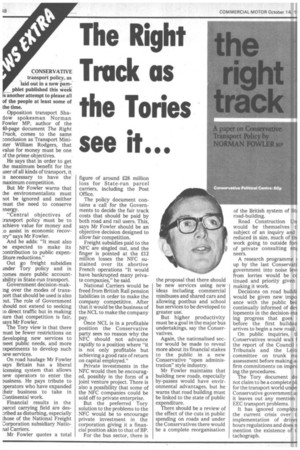The Right Track as the Tories see it...
Page 50

If you've noticed an error in this article please click here to report it so we can fix it.
CONSERVATIVE , transport policy, as _ _ -laid out in a new pamphlet published this week is another attempt to please all of the people at least some of the time.
Opposition transport Shadow spokesman Norman Fowler MP, author of the 40-page document The Right Track, comes to the same nonclusion as Transport Minister William Rodgers, that value for money must be one the prime objectives.
He says that in order to get the maximum benefit for the user of all kinds of transport, it is necessary to have the maximum competition.
But Mr Fowler warns that :he environmentalists must not be ignored and neither must the need to conserve energy.
"Central objectives of transport policy must be to achieve value for money and to assist in economic recovery" says Mr Fowler.
And he adds: "It must also 3e expected to make its :ontribution to public expenditure reductions."
Out go freight subsidies under Tory policy and in :omes more public accountability in State-run transport.
Government decision-making over the modes of transaort that should be used is also put. The role of Government thould not extend to seeking to direct traffic but in making ;ure that competition is fair, says Mr Fowler.
The Tory view is that there must be fewer restrictions on developing new services to meet public needs, and more experiments to develop such new services.
On road haulage Mr Fowler ;ays Britain has a liberal icensing system that allows new operators to enter the Dusiness. He pays tribute to Dperators who have expanded their business to take in Continental work.
Financial results in the ?arcel carrying field are des:Abed as disturbing, especially those of the National Freight Corporation subsidiary National Carriers.
Mr Fowler quotes a total figure of around £28 million loss for State-run parcel carriers, including the Post Office.
The policy document contains a call for the Governments to decide the fair track costs that should be paid by both road and rail users. This, says Mr Fowler should be an objective decision designed to allow fair competition.
Freight subsidies paid to the NFC are singled out, and the finger is pointed at the £12 million losses the NFC sustained over its abortive French operations "It would have bankrupted many private companies," he said.
National Carriers would be freed from British Rail pension liabilities in order to make the company competitive. After that it would be the business of the NCL to make the company pay.
Once NCL is in a profitable position the Conservative party sees no reason why the NFC should not advance rapidly to a position where "it is not only profitable but achieving a good rate of return on capital employed."
Private investments in the NFC would then be encouraged, possibly in the form of a joint venture project. There is also a possibility that some of the NFC companies could be sold off to private enterprise.
But the preferred Tory solution to the problems to the NFC would be to encourage private investment in the corporation giving it a financial position akin to that of BP.
For the bus sector, there is the proposal that there should be new services using new ideas including commercial minibuses and shared cars and allowing postbus and school bus services to be developed to greater use.
But higher productivity must be a goal in the major bus undertakings, say the Conservatives.
Again, the nationalised sector would be made to reveal more about its financial stakes to the public in a new Conservative "open administration" style industry.
Mr Fowler maintains that building new roads, especially by-passes would have environmental advantages, but he warns that road building must be linked to the state of public expenditure.
There should be a review of the effect of the cuts in public spending on roads and under the Conservatives there would be a complete reorganisation of the British system of Sti road-building.
Road Construction Un would be themselves tl subject of an inquiry and reduced in size, much of till work going to outside fon of private consulting eni neers.
A research programme up by the last Conservati government into noise levo from lorries would be ce tinued and priority given1 making it work.
Decisions on road buildi would be given new im.po ance with the public bei continually informed of deN lopments in the decision-ma ing progress that goes before the first bulldoz arrives to begin a new road.
On public inquiries, ti Conservatives would wait f the report of the Council Tribunals and the Leit( committee on trunk rm assessment before making al firm commitments on impro ing the procedures.
The Tory document do not claim to be a complete pi; for the transport world undei Conservative government it leaves out any mention EEC transport problems.
It has ignored complete the current crisis over ti implementation of driver hours regulations and does n mention the existence of CI tachograph.












































































































































































